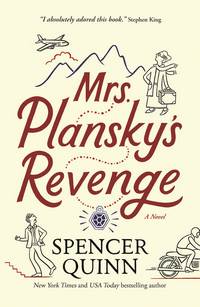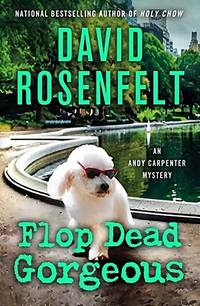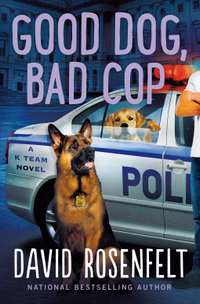 Up on the Woof Top
Up on the Woof Top
DETAILS: Series: Chet and Bernie, #14 Publisher: Forge Publication Date: October 17, 2023 Format: Hardcover Length: 307 pg. Read Date: November 15-17, 2023

What’s Up on the Woof Top About?
Bernie accompanies his elderly neighbors to a book signing for Dame Ariadne Carlisle, the author of a series of Christmas-themed mysteries. This, as one has to assume, is interrupted by some canine-induced chaos. However, it wasn’t Chet that got out of hand this time. Nevertheless, Chet and his human partner do grab the attention of Carlisle.
She ends up offering the duo a job they can’t turn down. She owns quite the little compound up in the mountains. It’s called Kringle Ranch and has buildings with names like Cratchit House. Carlisle knows her brand and has fully embraced it. As part of this brand, she owns a group of nine reindeer—her favorite, Rudy, has gone missing. For a sizeable payday, successful or not, she wants Bernie (or probably his friend with the superior sense of smell) to find Rudy and bring him back home.
Once they get to the Ranch, Bernie learns that Carlisle is suffering a career-risking case of writer’s block—which is ascribed to Rudy’s absence, but it could be the pressure that book 100 is too much for her. Or a combination of things. But it’s this block that Bernie really focuses on.
Or he tries to, anyway. Shortly after they arrive, the duo finds Carlisle’s personal assistant at the bottom of a gorge, barely alive. It turns out that Carlisle’s one, true love was also found at the bottom of that gorge, murdered, before she started writing. Bernie assumes that there’s a link between the two and plunges into the unsolved murder case as a way of finding the attempted murderer.
A Holiday Sampler
Along the way, we get the occasional excerpt from Carlisle’s Trudi Termaine series—which is interesting enough and does help you understand the character. But…I’ve gotta say, I hope Quinn doesn’t go the Seanan McGuire/A. Deborah Baker route and put out books under her name, I don’t know that I could deal with an entire novel’s worth of it.
(of course I would inevitably try it)
The Holiday Content
Unlike the previous holiday-themed installment, It’s a Wonderful Woof, where I said that it “would be very easy to forget that this is a Christmas/Holiday Themed novel,” it is impossible to forget that about this book. I mean, for crying out loud, Bernie is hired to search for a reindeer named Rudolph.
Christmas just flat-out permeates Up on the Woof Top. Thankfully, not in a cheesy way, or one that should offend anyone, or put off Scrooges. It’s part of the setting, it’s part of every plotline*, and the holiday is discussed frequently.
* I should probably qualify that with a “nearly,” but I can’t think of an exception off the top of my head.
None of this makes this one of those novels/stories that you can only read during the holiday season—like The Nutcracker or A Christmas Carol. Whenever you get to it during the year, it’ll be fine—but you won’t forget for a second what time of year it takes place in. (which makes it different from almost every single other book in the series, which could take place anytime)
Continuing Arcs
Sure, it wasn’t the biggest series-changing moment, but Chet getting out to…ahem…become a father was so subtle that you could be forgiven for missing it. And many of the series’ bigger moments (both for individual novels or overall) are underplayed—thanks in part to Chet not understanding them at the time or his unreliable narration.
That is not the case in this book. Not even close. Bernie does some things here that are going to change the books, his work, Chet’s life, and more in ways that readers can only guess at for now. (Quinn might only be guessing at for now, too)—and they make up the B-story, frequently distracting Bernie and the reader from murders, attempted murders, sleigh-pulling mammals, aging friends (new and old), and so on.
Here’s a fairly non-spoilery way to talk about how big and unusual Bernie’s actions in this novel are—he goes to his regular pawn shop not to hock or buy-back the watch. He goes there to just buy something. It threw me almost as much as it did the owners of the pawn shop.
So, what did I think about Up on the Woof Top?
“You did us proud. You’re the brains of the outfit, no doubt about it.”
Me the brains? That had to be one of Bernie’s jokes. He can be very funny at times. If I were the brains how could the Little Detective Agency be so successful, except for the finances part? Still, it was nice to hear. If only I knew exactly what I’d done I could do it again, and then hear Bernie say “You did us proud,” once more. Or even more than once! But you can’t have everything, which kind of makes sense, because who could possibly carry everything? You could have it, but you couldn’t go anywhere. What would be the point of that?”
I had a blast with this—there’s a subplot or scene or two that I wondered about. But they were either eventually justified or were fun enough that I didn’t care. The rest was just a ball of holiday-flavored Chet-goodness.
I never understood Bernie’s approach to the search for Rudy, I will admit. It really felt like he was just taking a vacation and occasionally remembered he had a chore to do. But that job was just an excuse to put him in this setting so he could look into this murder/attempted murder and associated shenanigans—that was clear from the jump (well, not what he was really going to be doing there, but that a case other-than the Rudy-hunt was in the wings)—so I didn’t worry about it too much. Also, the payoff to that particular gig was dealt with well enough by Quinn, that any quibbles just didn’t matter.
The novel is largely Bernie and Chet getting to play in the snow while doing what they do best while encountering a few characters that the reader will want to get to know better (a former Sheriff and a current deputy for starters). There’s a child that will steal your heart as he does Chet’s. And then there’s the setup for the series change that I mentioned above. Up on the Woof Top delivers plenty of fun from page 1 to 307.
Naturally, we get some healthy doses of what a friend calls Chet the Jet wisdom and other real heartwarming moments (see above quotation) that will flip in a moment to welcome silliness. There’s also a conversation about the lifespan of dogs that hit me right in “all the feels” after my dog’s recent death (it would’ve done it anyway, but the hit landed a bit harder). To be clear: I absolutely loved that moment and would’ve given the book 3 stars just because of it had I been annoyed by the rest of it.
Fans of this series will be very happy to unwrap this gift—and it should win a new reader over as well. If either of those two labels applies to you, I heartily recommend this novel to you.

This post contains an affiliate link. If you purchase from it, I will get a small commission at no additional cost to you. As always, the opinions expressed are my own.
![]()








